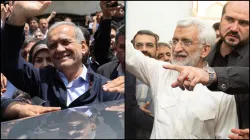Iran presidential elections: Moderate candidate to face hardline diplomat in run-off polls on July 5
A neck-to-neck contest was witnessed in Iran's tightly controlled presidential race between hardline Saeed Jalili and sole moderate candidate Massoud Pezeshkian. Saeed Jalili is a former nuclear negotiator close to the Supreme Leader while Pezeshkian advocates warmer ties with the West.

Tehran: Iran is set to hold a run-off presidential election on July 5 after neither of the top candidates secured more than 50 per cent of the votes in Friday's polls, according to the interior ministry on Saturday. Friday's vote came down to a tight race as the sole moderate candidate surprisingly surged ahead of the Supreme Leader's hardline protege in the counting of votes.
With more than 25 million votes counted on Saturday, moderate lawmaker Massoud Pezeshkian led with over 10 million votes ahead of hardline diplomat Saeed Jalili with over 9.4 million votes, according to provisional results released by the ministry. Neither of the candidates managed to secure 50 per cent of the votes, as required to claim the presidency of Iran.
The clerical establishment hoped for a high turnout as it faced a legitimacy crisis fuelled by public discontent over economic hardship and curbs on political and social freedom. However, turnout in Friday's vote hit a historic low of about 40 per cent, based on an interior ministry count released on Saturday.
The snap presidential elections were announced in the wake of former President Ebrahim Raisi's untimely death in a helicopter crash, culminating in a tightly controlled race with four candidates. The result of the elections may not result in any major policy shift in Iran as power ultimately lies with Supreme Leader Ayatollah Ali Khamenei, but it will set the tone of Iran's foreign and domestic policy.
What is at stake in Iran?
With Iran's supreme leader now 85, it is likely that the next president will be closely involved in the process of choosing a successor to Khamenei, who seeks a fiercely loyal president who can ensure a smooth eventual succession to his own position, insiders and analysts say. Jalili, who is considered close to Khamenei and is unknown for his uncompromised hardline stance, is in stark contrast to Pezeshkian's views, who advocates warmer relations with the West, social reform and liberalisation.
Hence a victory for mild-mannered lawmaker Pezeshkian might help ease tensions with the West and improve chances of economic reform. Although he is faithful to Iran's theocratic rule, Pezeshkian is backed by the reformist faction that has largely been sidelined in Iran in recent years. "We will respect the hijab law, but there should never be any intrusive or inhumane behaviour toward women," Pezeshkian said after casting his vote.
On the other hand, Jalili is fiercely loyal to the Supreme Leader and strongly adheres to the hardline ideals of the 1979 Islamic Revolution. He is currently a member of a body that mediates disputes between parliament and the Guardian Council, responsible for vetting presidential candidates. He was also an opponent of the 2015 nuclear pact with the US.
The election also comes at a time of escalating regional tension due to the war between Israel and Iranian allies Hamas in Gaza and Hezbollah in Lebanon, as well as increased Western pressure on Iran over its fast-advancing nuclear programme. Under Raisi's tenure, Iran's tensions with the West soared due to his uncompromising stance on the nuclear doctrine and domestic troubles.
Tightly controlled presidential race in Iran
More than 61 million Iranians over the age of 18 are eligible to vote, with about 18 million of them between 18 to 30. Meanwhile, Iranian activists and opposition groups are distributing the Twitter hashtag #ElectionCircus widely on social media, in a bid for a regime change. As per the rules, if no candidate manages to win at least 50 per cent plus one vote from all ballots cast, including blank votes, a run-off round between the top two candidates will be held on the first Friday after the election result is declared.
A hardline watchdog body called the Guardian Council made up of six clerics and six jurists aligned with Khamenei is tasked with choosing the candidates for the presidential elections. Only six candidates were selected from a pool of 80, and two hardline candidates - Tehran's mayor Alireza Zakani and head of the Martyrs' Foundation Amirhossein Ghazizadeh-Hashemi - dropped out of the race on Thursday. Just like the 1979 Islamic Revolution, women and those calling for radical change have been barred from the ballot while internationally recognised monitors have also been banned from observing the ongoing electuions.
(with Reuters inputs)
ALSO READ | Iran elections: Sole moderate candidate Massoud Pezeshkian surges ahead of hardliners in tight race